LisbonLisboaPortugal.com
The best independent guide to Lisbon
LisbonLisboaPortugal.com
The best independent guide to Lisbon
The Baixa district of Lisbon; a tourist guide for 2025
Baixa is the grand heart of Lisbon, a district defined by magnificent plazas, elegant avenues, and stately neoclassical architecture. Its rigid grid plan gives the entire district a unique sense of cohesion that stands in stark contrast to the organic maze of the city's older quarters
Its orderly grandeur was born from catastrophe. The district was completely rebuilt following the devastating 1755 earthquake, creating one of Europe's first grid-based city plans. Today, this historic core functions as Lisbon’s main commercial artery, its broad streets connecting the monumental waterfront arch of the Praça do Comércio with the lively central squares of Rossio and Figueira.
To spend time in Baixa is to immerse yourself in the daily rhythm of the capital, from shoppers browsing the historic storefronts of Rua Augusta to friends gathering at pavement cafés in the central Rossio square. The district buzzes with the life of the city: street performers draw crowds, the scent of roasting chestnuts fills the air, and the trams rumble past on their way to the Praça do Comércio.
Baixa’s appeal is its seamless blend of history and vibrant, contemporary life. It is a district that proudly displays its ceremonial past while functioning as Lisbon’s undeniable commercial and social centre. This is not just a commercial centre; it is the beating heart of Lisbon, the magnificent setting for the city's daily life.
Highlights of Baixa
The Praça do Comércio – The magnificent plaza that overlooks the River Tejo, and reflects the wealth and trading influence of Portugal during the late 18th century. At the head of the plaza lies the majestic Arco da Rua Augusta, and at it’s top is a fantastic viewing platform (a guide to the Praça do Comércio)
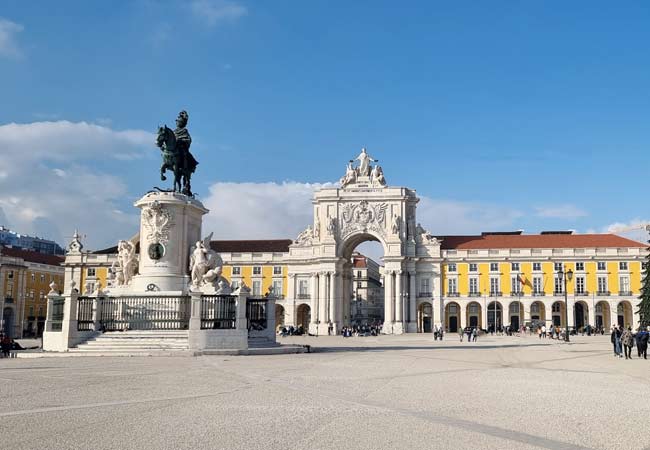
The Elevador de Santa Justa – This industrial age marvel transports passengers up one of the steepest hills in Lisbon. The lift dates from an era when wrought iron was an art form; there are mock-Gothic arches and finely crafted details, while inside the cabin is a polished wooden interior and brass dials.
Behind the Elevador de Santa Justa are the ruins of the Convento do Carmo, a permanent memorial to the 1755 earthquake (A guide to the Elevador de Santa Justa)
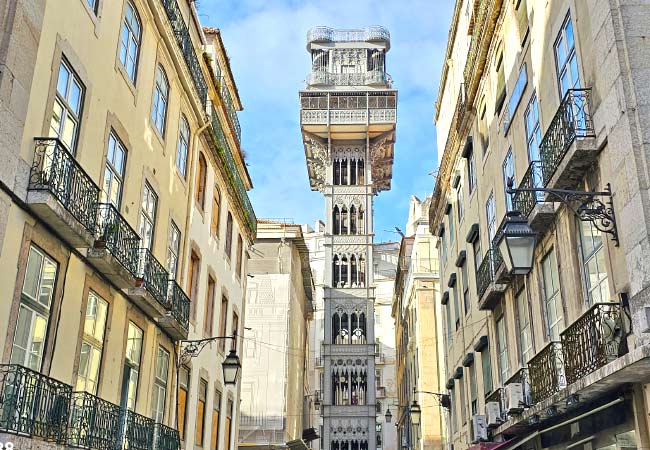
The Rua Augusta – The bustling main street of Baixa, with a colourful mix of traditional restaurants, tourist-focused shops and open-air cafes. The street connects Rossio plaza and the Praça do Comércio and passes beneath the Arco da Rua Augusta.
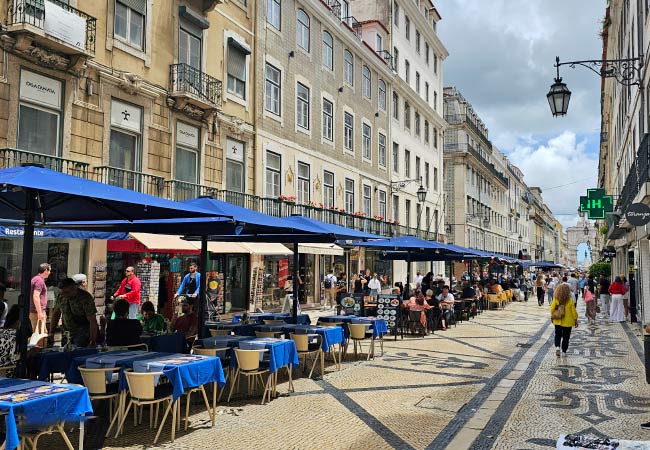
A glass of Ginjinha – There’s no better way to break up a day’s sightseeing than a glass of Ginjinha from its traditional home - the ‘A Ginjinha’ bar. This sweet cherry liquor was traditionally given as a cure for childhood illnesses and is beloved by the older generation of Portuguese. Opposite is the ‘Ginjinha Sem Rival’ bar (Ginjinha the Rival), an alternative Ginjinha producer - and an excuse for a second glass!! (a guide to Ginjinha)
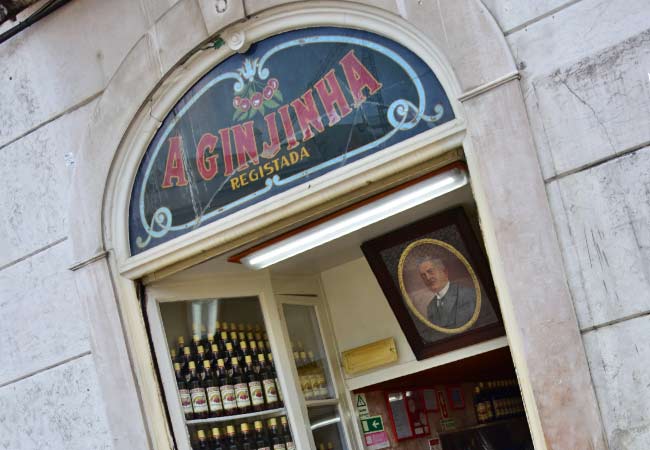
A quick overview of the Baixa district
Baixa lies in a valley between the hills of the Alfama district (to the east) and Bairro Alto (to the west), and extends from the Tejo Estuary up to the Praça Marquês de Pombal plaza.
Within Baixa there are five main plazas; the Praça do Comércio, the Praça dom Pedro IV (Rossio), the Praça dos Restauradores, the Praça Figueira and the Praça do Martim Moniz. The primary avenues run north to south and many are named after the merchants who had shops in the area (Rua da Prata – silversmith’s street, Rua dos Sapateiros – shoemaker’s street).
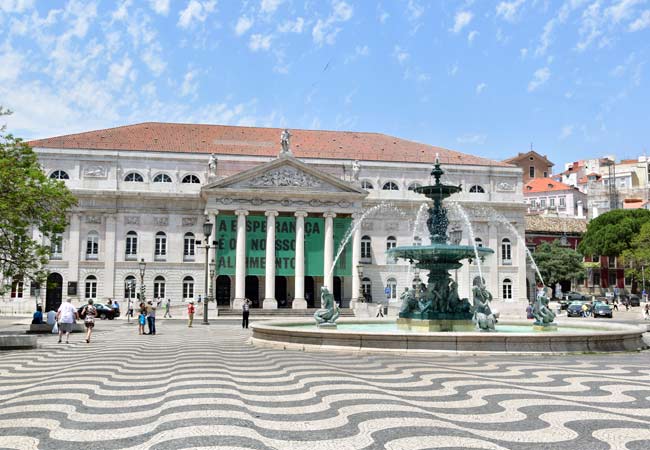
Rossio plaza, with its distinctive tiled pavements.
A tour of Baixa
The Baixa district is often where most tourists begin their discovery of Lisbon and is a fantastic location for a half-day of sightseeing. Frequently the Baixa and the Alfama districts are combined, and this is highly recommended.
Insight: There is excellent public transport to Baixa, and the Rossio metro station (green line) is the central station for the area.
The following map is our suggested tour of the Baixa district, which begins in Rossio. The yellow lines are common tourist routes, which could be added to the day trip. (Note: Zoom in or out to see all of the points)
Sights of the day trip: 1) Rossio plaza 2) Rua Augusta (shopping street) 3) Arco da Rua Augusta 4) Praça do Comércio 5) Lisboa Story Centre 6) Ribeira das Naus (waterfront) 7) Cais do Sodré (district) 8) Pink Street (nightlife) 9) Igreja de Santo António 10) Sé de Lisboa (cathedral) 11) Alfama (district) 12) Elevador de Santa Justa 13) Convento do Carmo 14) Rua Garrett (shopping street) 15) Praça Luís de Camões (Bairro Alto district) 16) Praça da Figueira 17) Martim Moniz plaza 18) Igreja de São Domingos 19) A Ginjinha (bar) 20) Praça dos Restauradores 21) Avenida da Liberdade 22) Praça Marquês de Pombal 23) Elevador da Glória 24) Igreja de São Roque
Point 11 leads to the Alfama district, and a guide with map can be seen here
Point 15 leads to the Bairro Alto district, and a guide can be seen here
Point 24 leads into the Príncipe Real district, and a guide can be seen here
Annoyance: While wandering the streets of Baixa, you will be likely approached by people selling drugs. Firmly tell them “no” and they will leave you. The police are unable to do anything as the “drugs” are just crushed (legal) herbs and seeds.
Money saving tip: Baixa is a popular tourist area, and restaurant prices reflect this, especially along the main avenues and plazas. For good value meals, head into the food court in the Armazéns do Chiado shopping centre (near point 14) or the Pingo Doce supermarket (GPS: 38.713811, -9.140286).
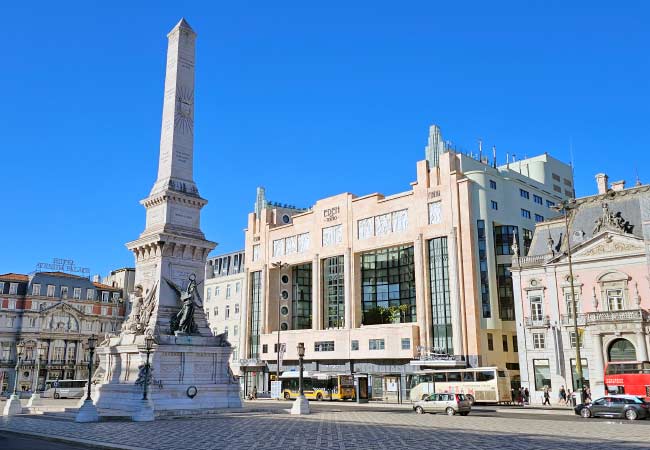
The Praça dos Restauradores, with the Art deco Eden theatre, Foz Palace and Obelisk monument
A stay in Baixa
For your trip to Lisbon, the Baixa district is one of the best districts to be based in. Being the centre of Lisbon, there is an extensive selection of hotels and restaurants, and there is always a vibrant atmosphere.
Close to Baixa is the delightful district of Alfama and the nightlife districts of Bairro Alto and Cais do Sodré.
There are excellent public transport links from Baixa; the train to Sintra departs from Rossio train station, the E15 tram to Belem departs from the Praça da Figueira, and the metro provides connections to the airport.
To the north of Baixa is the Avenida da Liberdade, Lisbon’s most exclusive shopping street and the location of many high-end hotels.
Related articles: Where to stay in Lisbon?
The map below shows the best accommodation and hotels to be found within the Baixa district. If you adjust it to suit your holiday dates, it will show the latest prices and availability:
The nightlife of Baixa
The nightlife of Baixa is primarily focused around evening meals, socialising in bars or performances in the theatres. The district has a selection of trendy and fashionable bars, and tends to be more high end than the Bairro Alto, which is the most popular nightlife area of Lisbon (and is just up the hill).
The best area for an evening meal or later drink in Baixa is along the Rua das Portas de Santo Antão, just to the east of the Praça dos Restauradores.
Baixa is a good location for family evening meals and does not have a rowdy or chaotic atmosphere, as with other districts, such as Cais do Sodré.
A trendy hang out is the Rooftop Bar at the Hotel Mundial.
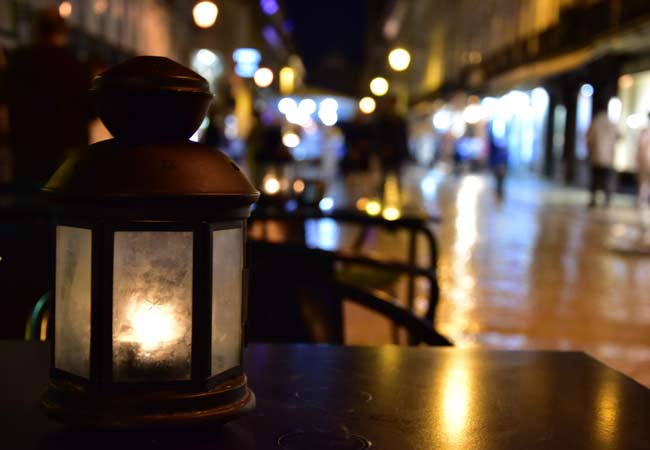
Is Baixa safe?
Baixa is a safe district of Lisbon, but use the same common sense you would back at home. With the high number of tourists, the area will always attract opportunistic thieves and pickpockets, but it is no worse than any other major city.
How much is a day trip to Baixa going to cost?
Baixa can be an inexpensive day trip if you choose to wander the district, enter the free religious buildings and admire the plazas. Entrance fees and costs are:
• Ride on the Elevador de Santa Justa – €5.30
• The Arco da Rua Augusta viewpoint – €4.50
• A glass of Ginja – €1.50
• The Elevador de Santa Justa viewpoint – €1.50
• A ride on the Ascensor da Glória funicular – €4.20
• Single metro ticket €1.85
• Igreja de São Roque €5.00
Insider tip: The 24-hour public transport ticket (€7.00) includes the Glória funicular, Elevador de Santa Justa and the E28 tram, along with all metro, bus and trams. This ticket is exceptional value, and is purchased from any metro station.
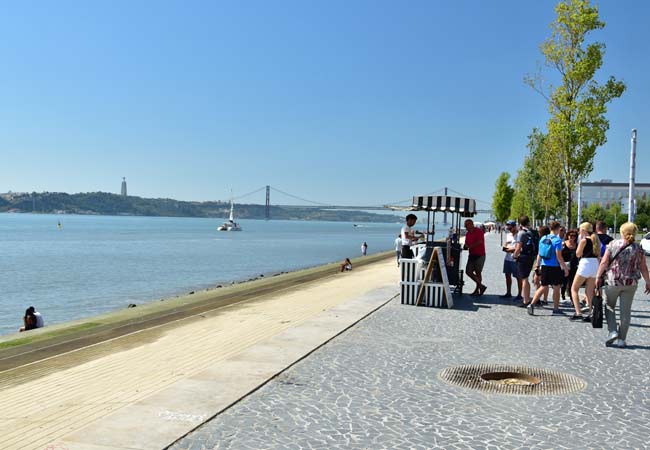
The Ribeira das Naus overlooks the Tejo estuary
The best viewpoints
As Baixa nestles between two steep hills, there are panoramic viewpoints over the district, so long as you are happy to climb the steep hills.
The best viewpoint is at the Jardim de São Pedro de Alcântara, a pretty garden at the top of the Glória funicular line. From here, it overlooks Rossio and central Baixa and to the castle on the opposite hill.
If you don’t fancy a climb, there is the Miradouro do Chão do Loureiro on top of the Pingo Doce shopping centre, and it is reached by a free lift (the Elevador Castelo).
The viewing platform at the top of the Arco da Rua Augusta (€4.50) provides wonderful views over the Tejo Estuary and the Rua Augusta.
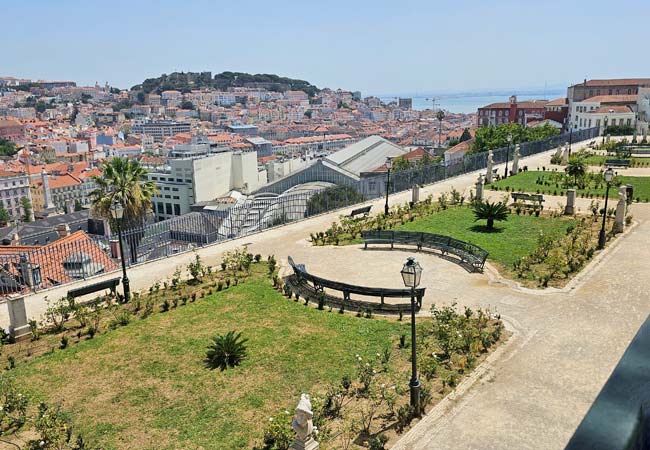
The Jardim de São Pedro de Alcântara
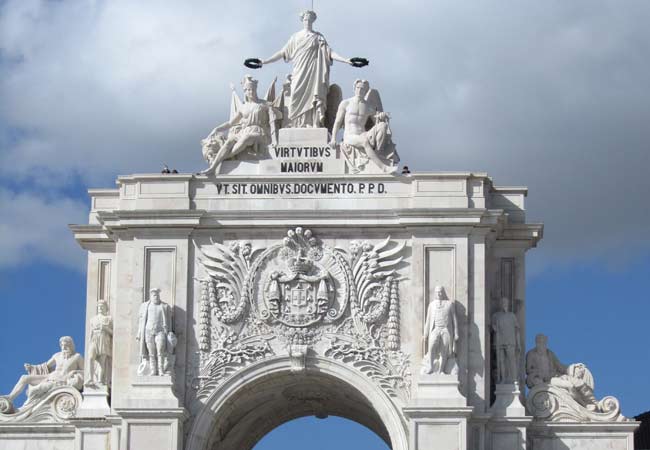
The Arco da Rua Augusta
Sights of the Baixa District
The Praça do Comércio is the grandest plaza in the Baixa district, and was historically where items from the Portuguese colonies were traded.
The plaza was originally the location of the Ribeira Palace, but it was completely destroyed by the 1755 earthquake. The only remnants are the marble steps at the water’s edge, where royal dignitaries would moor and centre the palace. At the centre of the Praça do Comércio is of Statue of King José I. (Praça do Comercio guide)
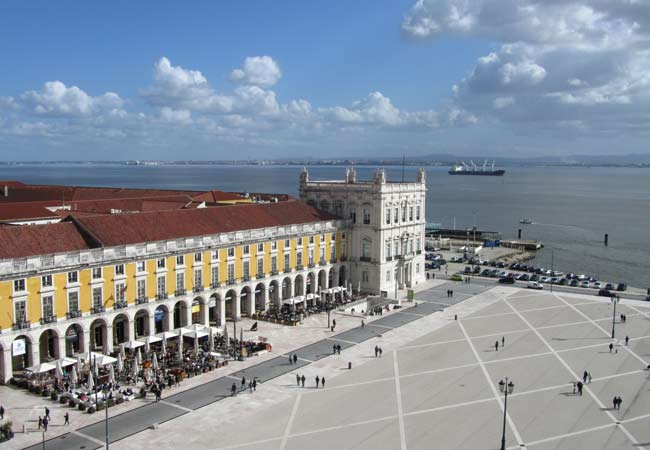
The Praça Dom Pedro IV is commonly referred to as Rossio and is regarded as the heart of Lisbon. Rossio is always a hive of activity and is a great place to watch the capital from one of the cafes that surround the square (Rossio guide).
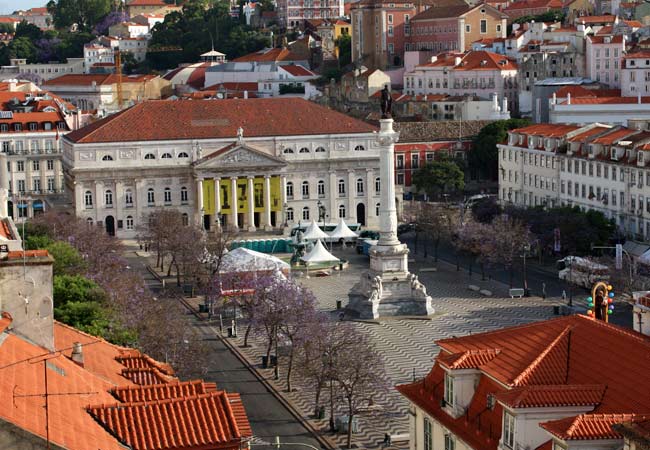
The Praça Dos Restauradores is one of Lisbon’s most varied squares, which combines the 19th century pink Foz Palace with the Art Deco Eden Theatre and the Gloria funicular. Standing at the centre of the square is an obelisk that celebrates the 15th-century independence from Spain.

The Igreja de São Domingos was once the largest church in Lisbon and was the site of 18th century Portuguese Inquisition, but was almost destroyed by fire in 1959. The restoration kept much of the fire-ravaged ruins, and there is supposedly a smoky aroma that still lingers from the fire.
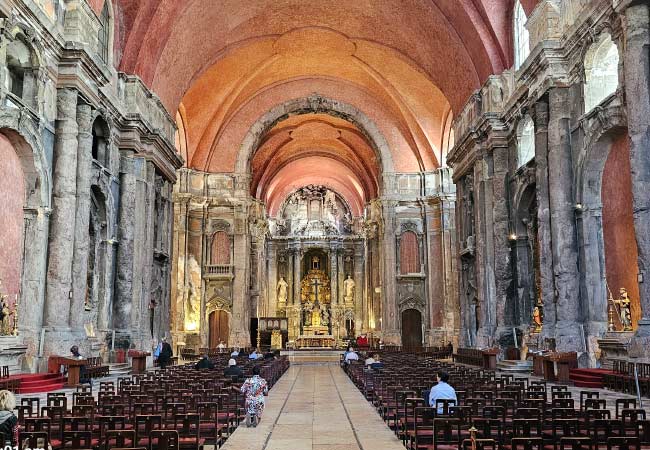
The Convento do Carmo was intentionally left as a ruin after the 1755 earthquake so that it could be a permanent reminder of the horrors that the residents of the city endured. Behind the ruins of the church is the pretty Largo do Carmo. (Largo do Carmo guide)
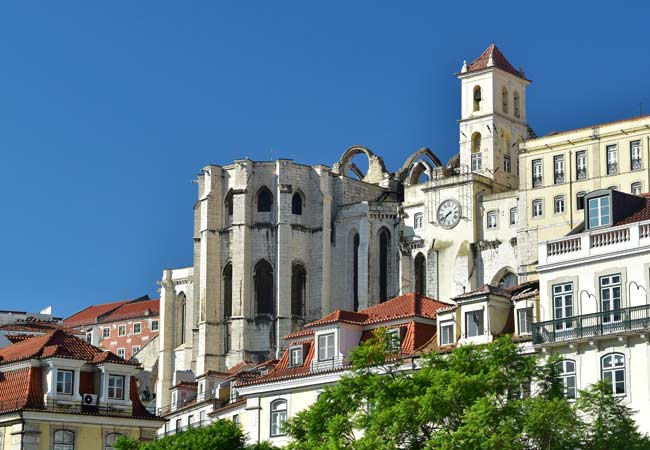
The Praça da Figueira was historically the site of Lisbon’s market and was housed under a larger covered market up until 1949. Today it is a hub for public transport.
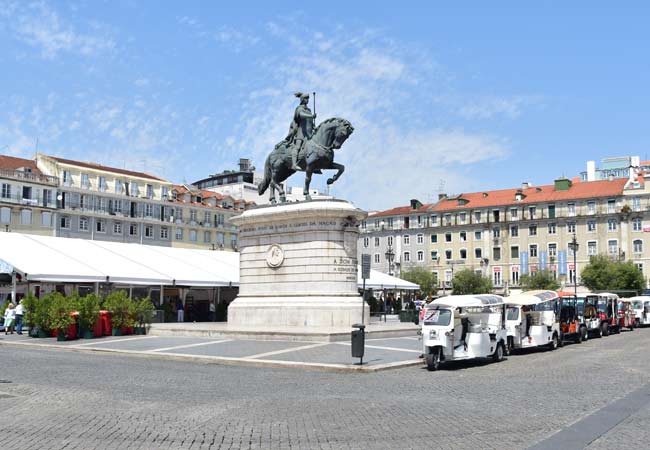
The Avenida da Liberdade is the pretty treelined avenue that extends from the Praça Marquês de Pombal to the Praça Dos Restauradores. This is Lisbon’s most fashionable shopping street and home to many high-end retailers, restaurants and hotels.
Discover more of Lisbon with our most popular guides
If you've found our content valuable, we'd welcome your support.
The digital publishing landscape has evolved significantly. As a small independent publisher, we face growing challenges. Search engines increasingly favour paid content over organic results, while AI-generated content often reproduces original work without attribution.
To support our work, please consider bookmarking this page (press Ctrl + D) for quick access. If you find an article helpful, we'd be grateful if you'd share it with friends on social media.
For specific questions, please see our Reddit community at r/LisbonPortugalTravel.
Should you notice any outdated or incorrect information, please contact us at [email protected]
Thank you for helping us continue to provide valuable content in an increasingly challenging digital environment.
A complete list of all of our Lisbon articles
If you've found our content valuable, we'd welcome your support.
The digital publishing landscape has evolved significantly. As a small independent publisher, we face growing challenges. Search engines increasingly favour paid content over organic results, while AI-generated content often reproduces original work without attribution.
To support our work, please consider bookmarking this page (press Ctrl + D) for quick access. If you find an article helpful, we'd be grateful if you'd share it with friends on social media.
For specific questions, please see our Reddit community at r/LisbonPortugalTravel.
Should you notice any outdated or incorrect information, please contact us at [email protected]
Thank you for helping us continue to provide valuable content in an increasingly challenging digital environment.



































